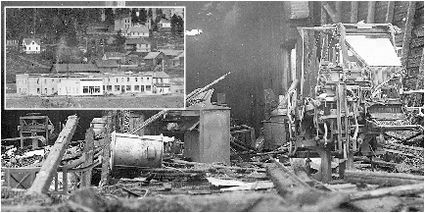Remember When?
June 13, 2019

Sanders County Historical Society photo
THE SANDERS COUNTY INDEPENDENT LEDGER burned in the winter of 1923. The linotype machine is at the right. The white building in the foreground of the inset picture was the structure that burned. The Ward Hotel (Black Bear Inn) is directly behind it. First Security Bank now occupies that site.
HAPPENINGS IN THE
EARLY CITY COUNCIL
Excerpt from A Heritage Remembered by Lorraine Dufresne
May 5, 1919 – Newly elected members of the council: Mayor S.A. Hurlburt; Aldermen, Andrew Peterson, Wilbur Coleman and W.A. Peterson; Town Attorney, A.S. Ainsworth; Town Marshall, J.H. Prouty; Town Clerk and Police Magistrate, W.A. Nippert.
A special meeting was called before the June 2 meeting to consider placing of concrete sidewalks and installing a drinking fountain, which would cost between $150 and $175. Florin Corner was the recommended location. The Old Jail Museum has this drinking fountain, which was situated on the corner of Fulton Street and Main Street in front of the Black Bear Hotel.
July 7 – Nippert was paid $16.70 as town clerk and $10 for lighting streets, per month. The city's first street lights were gas and needed to be lit every night and extinguished come day time.
August 4 – A contract was let for sidewalks at Fulton, Mill and Broad streets.
November 3 – Charles Caro, with truck, authorized to gravel Jefferson Street.
March 1, 1920 – Ordinance drawn up pertaining to sanitary toilets with sewer connections to include all buildings between Fulton and Ferry on Lower Railroad Avenue and the N.P. right-of-way. The sewer pipes emptied into the Clark Fork River.
April 1 – Annual town elections to be held first Monday of April. S.A. Hurlburt was elected Mayor for two more years. His last meeting was April 3, 1922.
December 6 – Professor Mead appeared before the council asking for a loan of $400 from the general fund to carry on the Public Library. Request granted.
February 7, 1921 – Ordinance #98. Limiting speed of trains to 12 miles per hour through town limits. Automobile speed also to 12 m.p.h.
June 13 – Petition to grant permission to erect bandstand on N.P. right-of-way near depot.
January 9, 1911 – William Whittley allowed $82 for work on skating rink by Ward Hotel. David Hougland (the former mayor's son) would be paid $10 per month for turning the street lights off and on. C.I. Wicksell, Mayor.
October 2 – The Clerk was instructed to notify Dr. Peek to repair the top of the brick wall over his Post Office and Drug Store building as same was considered dangerous.
A special meeting held November 10 to consider application of Dr. Peek for a permit to erect building destroyed by fire in Lots 4 and 5 of Block 2. By unanimous vote he was granted a permit to erect a brick veneered building on said lots.
February 5, 1923 – The Clerk was requested to notify owners of the old printing office that said building is hereby condemned as being unsafe and that immediate steps be taken to tear it down or rebuild in a safe condition. Said print office was The Ledger and was located where First Security Bank is now situated.
June 4 – All wooden sidewalks condemned as unsafe and the Clerk should notify all property owners to replace them with cement, all work being completed by July. They were to be 4 feet 6 inches wide.
September 5 – All property owners were ordered to remove all buildings and refuse from the alleys.
March 2, 1925 – Action was taken against Gravity Water Company, a corporation supplying water to the Town of Thompson Falls. Words used were "refusing and failing to furnish a proper and adequate supply of water for the needs of Thompson Falls. At times the mains were allowed to run partly full, this filling the water with air and making it unfit for domestic use, and it was quite often filled with dirt." Steps were taken to redo this situation and the Public Service Commissioners were to be notified.
May 3 – It was moved and seconded that an ordinance be drawn up as a Curfew Ordinance, that the age limit be 18 years and the same be enforced at 9 p.m. each day.
July 6, 1926 – A resolution to obtain from Fred L. and Susan M. Thayer, a parcel of land to be used as a dumping ground for garbage at a price of $100 for a term of 50 years.
April 5, 1927 – Bids let for trimming all shade trees on lower Railroad Avenue and Fulton Street. W.H. Benham was low bidder, said bid being $50. He was also hired to collect dog and poll taxes, 50 cents for each dog and 25 cent poll tax, all to be paid to the Town Treasurer
December 5 – Heater and sons were given permission to cut the shade trees on west side of garage building from Railroad Avenue to the alley.
February 6, 1928 – Resolution passed to let Heater and sons put in a gas pump on the sidewalk 6 feet from the curb. Heater & Heater garage was located east of Realty Northwest and is now a parking lot.
March 3, 1930 – Railroad agrees to raise wide tracks to height of main line rails and furnish the town with gravel to raise and widen the approaches of all three crossings. The railroad asked for a higher rate of speed through town. The clerk was requested to write as to "what rate of speed."
July 21 – All the discussion on oiling Railroad Avenue at the July 15 meeting brought about results of the streets being oiled. It was done by help of donation with a resolution that the town would take care of it in future years. A carload of oil was ordered from Hart Refineries in Missoula. The Clerk was to make collections of subscriptions for oiling.






Reader Comments(0)